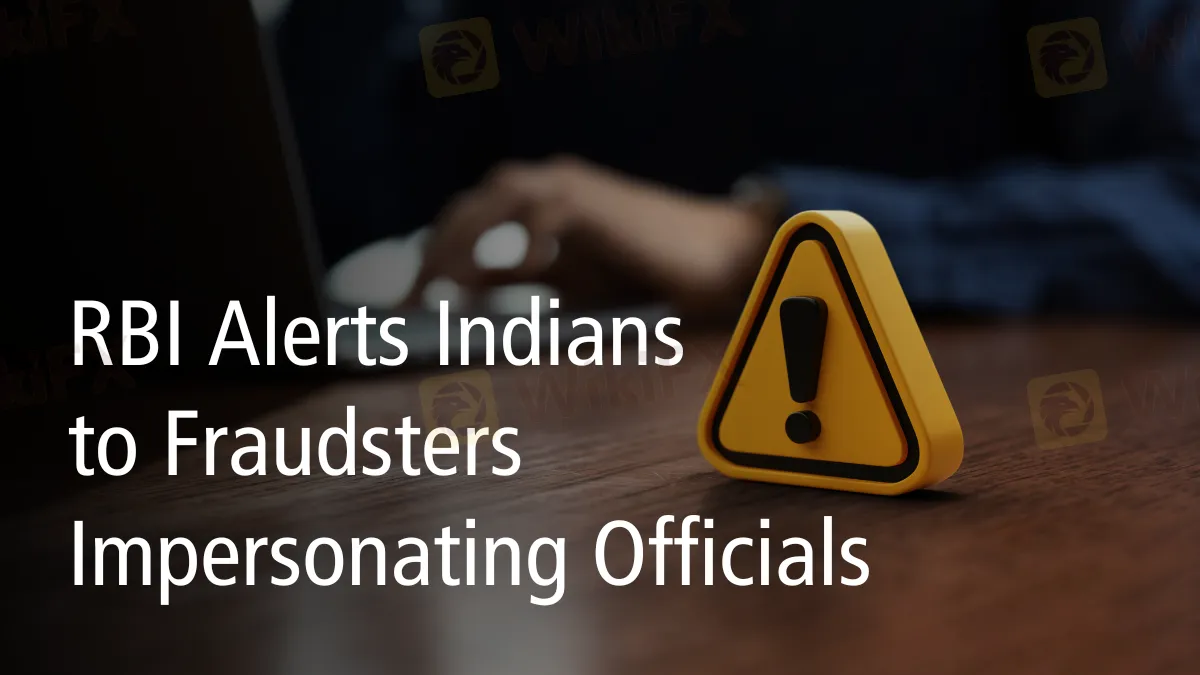简体中文
繁體中文
English
Pусский
日本語
ภาษาไทย
Tiếng Việt
Bahasa Indonesia
Español
हिन्दी
Filippiiniläinen
Français
Deutsch
Português
Türkçe
한국어
العربية
RBI Alerts Indians to Fraudsters Impersonating Officials
Abstract:RBI warns Indians about fraudsters posing as officials, using fake documents and intimidating tactics. Stay alert to avoid falling victim to these scams.

The Reserve Bank of India (RBI) has issued a severe warning to the public over the rising threat of fraudsters impersonating its personnel. These fraudsters utilize sophisticated strategies to trick unwary people and organizations, sometimes impersonating RBI workers or government officials to obtain money under false pretenses.
The RBI has discovered that these fraudsters employ forged RBI letterheads, email addresses, and other official-looking papers to persuade their victims of their credibility. Their basic strategy is approaching small and medium-sized firms by pretending to provide lucrative government contracts or initiatives. To guarantee these phony transactions, the scammers want a “security deposit,” which they promise would result in big payouts in the future.
In addition to attacking companies, these imposters entice people with promises of lottery winners, cash transfers, international remittances, and government programs. The RBI has said that it does not send emails or communications involving the distribution of lottery money or any similar promotions. The public is advised to be wary of any message that promises quick money or asks for personal or financial information.

The RBI has also highlighted a particularly concerning trend: fraudsters use threatening techniques to compel their victims. These crooks often impersonate RBI officials and call victims, threatening to shut down or deactivate their bank accounts if they do not meet their demands. The requests might include providing personal information, account information, or one-time passwords (OTPs). In certain circumstances, users are forced to install unapproved and unverified programs via links given by scammers.
The RBI has also advised against cases in which fraudsters impersonate government officials or RBI personnel, accusing victims of participation in illicit activities such as money laundering, counterfeiting, or suspicious financial transactions. These threats are intended to cause fear and drive victims to comply.
Furthermore, some fraudsters have been caught claiming accreditation or registration with the RBI to market unlicensed digital lending applications and other questionable financial services. The RBI has urged the public not to trust any websites or applications claiming to be RBI-accredited without sufficient verification.
In its statement, the RBI strongly advised the people to be watchful and not fall victim to these fraudulent schemes. The central bank continues to monitor these operations and is dedicated to safeguarding the people from financial fraud.
Stay protected! For more on this and other financial safety updates, visit the WikiFX News page for the latest insights.

Disclaimer:
The views in this article only represent the author's personal views, and do not constitute investment advice on this platform. This platform does not guarantee the accuracy, completeness and timeliness of the information in the article, and will not be liable for any loss caused by the use of or reliance on the information in the article.
Read more

Are Trading Courses and Mentors a Fast Track or a Financial Trap?
In recent years, trading has become more popular than ever. Social media is full of people showing off their “trading lifestyle” with expensive cars, luxury holidays, and promises of easy money. Many of them claim to be mentors, investment coaches, or run online trading academies. They say they can turn beginners into full-time traders in just a few weeks. But is it true, or is it just a clever scam?

Using Any of These Illegal Forex Trading Apps? Stop Before It Turns into a Crisis
The Reserve Bank of India (RBI) has listed out some illegal forex apps India. Read this article to know some of those apps.

5 Reasons to Stay Away from Core Prime Markets
The Forex market is a very unpredictable, complex, and risky place. There are many brokers that appear genuine but can steal your hard-earned money. So, staying alert is the only way to survive in this dynamic environment. Therefore, in this article, we are sharing 5 warning signs about Core Prime Markets.

Think Before You Trade! Unlicensed Brokers List Inside
The French regulator AMF has issued a warning against five unlicensed brokers. Investors are encouraged to verify the list to protect themselves from fraud.
WikiFX Broker
Latest News
PU Prime and AFA Announce Partnership at Madrid Event
ASIC Warns of Escalating Share Sale Scams Amid $119M Scam Losses
A Guide to RBI Forex Rules in India
“Wins with $19,916 weekly profit on Exnova”? There is something you should know.
Oil Prices Slide After Cease-Fire
IQ Option: Regulation, Warnings, and What Traders Need to Know
How Macro Events Drive Energy Price Fluctuations and Their Linked Impact on the Global Forex Market
Clones of ThinkMarkets Are Lurking | Don’t Fall for the Fake
Top 5 Forex Brokers Offering Islamic Accounts in 2025
Family offices double down on private credit and infrastructure during private equity slump, survey finds
Currency Calculator


